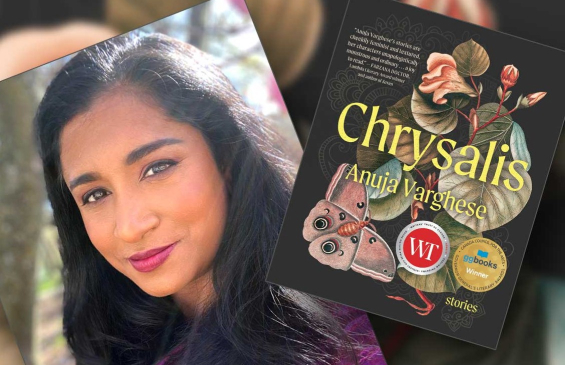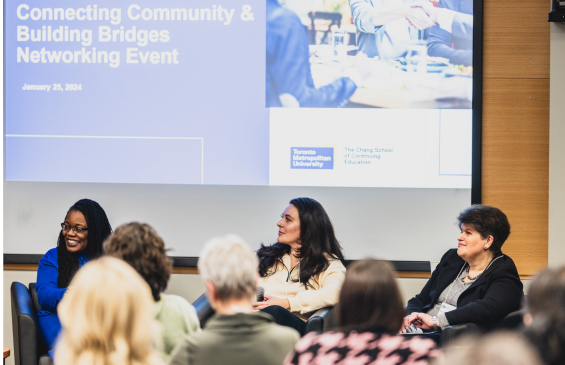Empowering Readers Through Lived Experiences: Meet Author Anuja Verghese

September 10, 2024
Anuja Varghese has always been passionate about her work in the nonprofit sector. But when she got laid off in 2019 due to restructuring, she decided to pursue her lifelong dream of becoming a published author. Since then, her award-winning short story collection, Chrysalis, was published in 2023 and has won two prestigious literary awards. The book challenges the lack of representation she saw not only in mainstream books and novels but even her own earlier writing – something that she hopes will empower not only her readers but other writers as well.
Despite her recent success with Chrysalis, which won both the 2023 Governor General’s Literary Award for Fiction and the 2023 Writers Trust Dayne Ogilvie Prize for LGBTQ2+ Emerging Writers , Anuja still hasn’t quit her day job in the nonprofit sector. Anuja is a graduate of the Certificate in Nonprofit and Voluntary Sector Management from The Chang School and gave a book talk earlier this year at Toronto Metropolitan University.
She found time in her busy schedule to speak with Chang School Stories on how she got published, giving South Asian trans and queer women a voice through literature, what inspires her, and why she continues to work a full-time job despite becoming a successfully published author.
The Chang School: How did you make the transition from working for nonprofits to becoming a published author?
Anuja Varghese: When I got laid off I remember asking myself, ‘What do I really want to do? Do I want to just jump into another non-profit?’ I had this moment where I said, ‘I have to write and I'm going to give it a shot.’ I didn't know at that moment if anything would come of it – if I would write anything good, if it would get published, or if anybody would read it, but I kind of made that intentional decision just to try so I started taking more writing workshops.
I enrolled in the creative writing program at a Toronto university and just started sending stuff out to writing contests and literary magazines. I got a ton of rejections but also started to get some yes’s and got some things published. I then met with a mentor who was the first one to look at my stories on paper and thought they could work as a collection, so I started putting together a short story collection.
I pitched it to publishers but it was radio silence for nine months. I thought nobody wants it and decided to work on something else but then finally House of Anansi Press got back to me with a yes.
TCS: As you have worked with people who are underrepresented in the population while in your role in the nonprofit sector, how does it feel to not only give South Asian queer and trans women amongst other minorities a voice in your literature?
AV: My day-to-day work at YWCA Hamilton revolves around the question of, how do we empower women and girls? How do we address systems of patriarchy and oppression that keep minorities marginalized? If you read the stories in Chrysalis you can see a lot of that day-to-day work trickling into the writing of the stories themselves. They’re not linked stories per se but they’re all linked by this idea of women and girls in moments of transformation.
Chrysalis looks at the ways women and girls of colour, particularly queer folks, are oppressed and marginalized and have power taken away from them. My stories are more fantastical in that sometimes a character gets to be a shape-shifter and eat their enemies. There’s power in that and fun and escapism as well.
There’s a lot of heavy subject matter throughout the stories like racism and homophobia. However, I think there’s something to the idea that you can tell someone a fact or you can tell someone a story – if you tell them a story, they’re much more likely to absorb what you said.
When I first started writing, all my characters were straight white people because that’s what I’d been exposed to in literature I’d read and I didn’t give it a second thought. I just assumed that’s what other people would relate to and this is what people will read. I really had to be intentional about why I’m doing this and how I’m going to write about people that look like me.
TCS: Apart from giving these aforementioned minorities a voice and drawing on their stories to write about, where else do you find inspiration for your published work?
AV: Give yourself some patience and gentleness as well as flexibility for when you make time to write. Those are the conditions in which your creative self is going to thrive.
I wrote this book for all the girls and women who don’t see themselves in most stories – I want to say to them that you are worthy of reflection despite what you’ve been told. My joke’s always like, ‘There’s no Anuja of Green Gables’ so I had to create those characters.
TCS: Apart from giving these aforementioned minorities a voice and drawing on their stories to write about, where else do you find inspiration for your published work?
AV: Give yourself some patience and gentleness as well as flexibility for when you make time to write. Those are the conditions in which your creative self is going to thrive.
I wrote this book for all the girls and women who don’t see themselves in most stories – I want to say to them that you are worthy of reflection despite what you’ve been told. My joke’s always like, ‘There’s no Anuja of Green Gables’ so I had to create those characters.
TCS: Do you have plans to write more short stories or other formats?
AV: I’m working on a novel along the lines of a fantasy like Dungeons and Dragons meets Bollywood. Stay tuned!
AV: I don’t think ‘pivoting’ is the right word. Very few successful writers in general, especially in Canada, are doing just that. Everyone is busy doing other things like teaching or editing or in my case, working for a nonprofit. My advice is to look for ways to balance your creative pursuits with the rest of your life. I have two little kids, volunteer work, and I have my nonprofit job alongside writing. Realistically those things never go away, but they can all co-exist.

